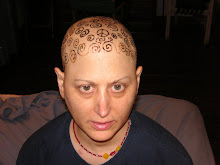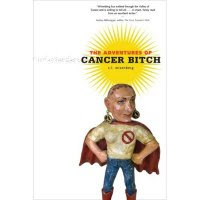I have decided that these Cancer Bitch entries are cronicas. What is a cronica? "A literary genre peculiar to the Brazilian press," claims the back cover of Clarice Lispector's Selected Cronicas, which appeared originally in the Brazilian press. "In Chile," writes professor Joel Hancock in Hispania magazine, "the writing of cronicas has traditionally been an outlet for men of letters." In Mexico there are younger authors, the so-called 1968 generation, who wrote the "nuevo cronica," a politically-charged piece of writing that was a mix of high and low culture, Mexico's answer to the New Journalism of the U.S. There's the "cronica literaria," which is a book review. All of which doesn't say much but should give you the idea that it's a Latin American form, usually published in a newspaper by a person of letters. The pieces can be about literature, politics, personal life, current events, whatever strikes the writer as interesting. Eduardo Barrios, we're told by professor Hancock, wrote about "questions related to the economy; on methods of education; and on new techniques in agriculture... the importance of wearing berets, taking snuff, drinking wine, and the impact of Charlie Chaplin films." The equivalent in the US might be a newspaper column, but generally our columnists are not belles lettrists--belles lettres being another foreign designation for something we sorta kinda have/don't have in our popular culture. Then there's the European feuilleton, which was similar or the same--literary writing that appeared in a newspaper. Feature writing, you could say. Commentary. Drama reviews. But again, written by a person of letters who was known for his or her erudition and books. The presence of books is the key. In the US journalists might go on to write books, but they usually don't go back and forth between books and newspapers. Norman Mailer doesn't have a steady gig on the op-ed pages of the New York Times. Thomas Friedman, who does, writes books, but not Literature. And everyone loves Anna Quindlen but me so I won't even mention her.
However, what Kurt Vonnegut was writing in In These Times could be called cronicas. You could say that Nora Ephron and Jane Smiley write cronicas for the Huffington Post. But blogs are another animal, by their very nature, referring to other points on the internet. And I think that part of the definition of cronica is context: a literary piece within mass media. What is the context for blogs? They exist within the entire internet stratosphere.
Susan Sontag's infamous piece on 9/11 in The New Yorker was a cronica. Are they always short? Short but not ephemeral? That's what I seem to be saying. Is the cronica literary journalism? Another word for essay? If so, why does the bilingual MFA program at UT-El Paso ask for an "essay" as a nonfiction sample in English, and "cronica o ensayo" in Spanish?
Mas preguntas: What happens to the cronica when daily newspapers and daily newspaper subscribers are dying? Are newspapers dying in Latin America as they are here or are they blossoming with new democracies? I am going to look up a collection of essays, The Contemporary Mexican Chronicle: Theoretical Perspectives on the Liminal Genre, and see what I find out.
Now I've gotten myself in a tight corner here because I said at the outset that I'm a writer of cronicas, thus puffing myself up into some kind of artiste. Well, you be the judge of that. I would like to call all this the Cancer Bitch Cronicas, but of course that would make me sound like I'm trying to pass myself off as a Latina as well. My first-cousin-once-removed, the family genealogist, maintained for a time that we were Sephardic Jews, originating from pre-Inquisition Spain. This may be the case, but she hasn't pushed this argument for a number of years. I claim this heritage during Passover, because then it means I can eat by the looser Sephardi rules and have corn, beans and rice. But I'm clearly a daughter of Osteuropa, with grandparents and great-grandparents from Slutsk, Kishinev, Kovno and other consonant-studded towns. I like the sound of cronica because it sounds like "chronic," and that's what a lot of this material is about. Chronic anxiety. I hope I have one-time-only cancer, and not chronic cancer, because that would mean it had settled in my bones and blood, and that the clock was ticking, ticking for me. Cancer isn't universally chronic, like asthma and allergy, though a woman known as Chronic Babe has recently decided to include cancer information in her blog. Because once you have cancer, you chronically fear you still have cancer, or that the cancer's come back.
Chronic, from the French chronique, from Latin chronicus, from Greek khronikos, of time, from khronos, time. Which chains us all.
Lispector died of cancer.
skip to main |
skip to sidebar


taramosalata & other dips; photo by Vera Szabó

cream puffs, caprese; photo by Vera Szabó

Don't try this at home. Uh, oh, we did.

L the Haircutter in Background

Finished.

design by Jennifer Berman

At medicinal baths, with testimonials from patients
One Feminist's Report on Her Breast Cancer, Beginning with Semi-diagnosis and Continuing Beyond Chemo, w/ a side of polycythemia thrown in **You don't have to be Jewish to love Levy's rye bread, and you don't have to have cancer to read Cancer Bitch *** Cancer Bitch comes to you from S.L. (Sandi) Wisenberg in Chicago
Click on photo for Cancer Bitch reading/lecture schedule
Blog Archive
-
▼
2007
(192)
-
▼
June
(17)
- Just a Little Bit Menopausal
- Cancer Bitch Meets the City Clerk
- Taking Taxol/I feel petty, oh, so petty
- All in All, I'd Rather Have a Puppy
- The tongue,
- Sacre Vert
- Guilt
- Bleed Me a River
- Bloggers R Us
- Sunday/Paper/Critters
- Saturday with Doctors and Writers
- Bourgeois Pig (R)
- Marks
- Hijo de Cronica
- Cronica
- Birds
- LOUTS
-
▼
June
(17)
Cancer Bitch recommends these links:
- Alternet.org
- As the Tumor Turns
- Being Cancer--its on-line book club discusssed my book.
- Big Grrls DO Cry: queer life meets precarious life
- Black Gyrl Cancer Slayer
- Breast Cancer Action
- breastcancer.org
- Chemo Chicks
- Chronic (Illness) Babe
- Code Pink women's peace group
- Collaborative on Health and the Environment
- Colon cancer cowgirl
- Earth Henna
- Friends of Cancer Bitch on Facebook
- Funny Cancer shirts and mugs
- Gayle Sulik, Pink Ribbon Blues
- Geezer Sisters (tho' only written by one of them)
- Get Real About Breast Cancer (w/ pic of Breast Cancer Barbie)
- Gilda's Club
- Goodbye to Boobs (by a pre-vivor)
- Humerus Cartoons
- I got the cancer (lymphoma)
- Mamawhelming
- Organic Consumers Assn.
- Our Bodies, Our Blog
- Paula Kamen
- Planet Cancer
- Recovery on Water
- S.L. Wisenberg/Red Fish Studio
- Skin Deep: un/safe cosmetic list
- Stacey Richter's Land of Pain
- Swimming in the Trees: author Jessica Handler of Atlanta
- Tara Ison
- Terry Tempest Williams
- The Assertive Cancer Patient
- The Cancer Culture Chronicles
- The Fifty-Foot Blogger, another denizen of Fancy Hospital
- Whirled News--better than the Onion
- Women & Children First bookstore
NOTATE BENE
Everything here is as accurate as I could make it. Occasionally I've changed identifying details when writing about others.
Links to audio and video

from my Farewell to My Left Breast party

taramosalata & other dips; photo by Vera Szabó
Farewell to My Left Breast Party

cream puffs, caprese; photo by Vera Szabó
April 12, 2007--The Making of the Mohawk

Don't try this at home. Uh, oh, we did.
The Mohawk Profile

L the Haircutter in Background
The Mohawk Demure

Finished.
Summer henna-wear
design by Jennifer Berman
Life after cancer, Budapest, July 2009
At medicinal baths, with testimonials from patients


